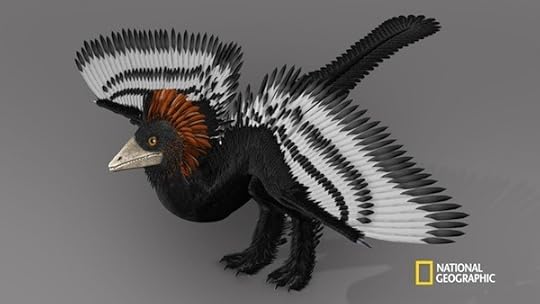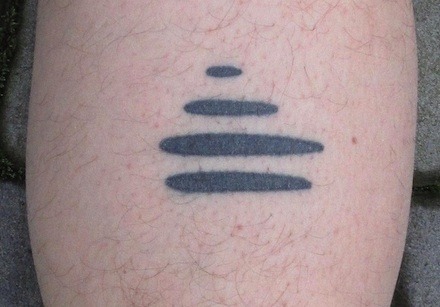Carl Zimmer's Blog, page 103
February 5, 2010
Is Telephony Making Us Stupid?
 The more people yell about Facebook, Google, and Twitter, the more I think back to Mark Twain, and his 1880 sketch, "A Telephonic Conversation."
The more people yell about Facebook, Google, and Twitter, the more I think back to Mark Twain, and his 1880 sketch, "A Telephonic Conversation."
I consider that a conversation by telephone—when you are simply sitting by and not taking any part in that conversation—is one of the solemnest curiosities of this modern life. Yesterday I was writing a deep article on a sublime philosophical subject while such a conversation was going on in the room. I notice that one can always write best when...
February 4, 2010
Dinosaur Colors: Now Officially Redonkulous
 I seem to have ended up as the Dinosaur Feather Color Bureau Chief at the New York Times. After discovering colors in fossil bird feathers, scientists found colors in dinosaurs last week. But this week another group of scientists has got the color pattern across a dinosaur's entire body.
I seem to have ended up as the Dinosaur Feather Color Bureau Chief at the New York Times. After discovering colors in fossil bird feathers, scientists found colors in dinosaurs last week. But this week another group of scientists has got the color pattern across a dinosaur's entire body.
Imagine: Silver Spangled Hamburgs of the Jurassic!
Image courtesy of National Geographic. Check out their 3-D version .
February 3, 2010
National Academies Communication Award: Nominations Open
 I'll be a judge again this year for the National Academies Communication Award, a $20,000 prize for excellence in reporting on science. The prize is awarded in four categories:
I'll be a judge again this year for the National Academies Communication Award, a $20,000 prize for excellence in reporting on science. The prize is awarded in four categories:
Book
Magazine/Newspaper
Film/Radio/TV
Online
The nominations are now open. More information can be found here.
Your Inner Amazon
 One of the most mind-blowing things I learned about while writing my book Microcosm: E. coli and the New Science of Life was the incredibly diversity of microbes that call our bodies home. These microbes outnumber our cells by about ten to one, and collectively they have thousands times more genes than found in the human genome. E. coli may be the most familiar of these lodgers, but it is just small player in an inconceivably complex ecosystem on which our health depends.
One of the most mind-blowing things I learned about while writing my book Microcosm: E. coli and the New Science of Life was the incredibly diversity of microbes that call our bodies home. These microbes outnumber our cells by about ten to one, and collectively they have thousands times more genes than found in the human genome. E. coli may be the most familiar of these lodgers, but it is just small player in an inconceivably complex ecosystem on which our health depends.
So I was very...
Who You Calling Authoritative?
Thanks to the UK Times for including The Loom among their top science blogs. It's great company to be in, including fellow Discover blogs Bad Astronomy and the Intersection. I am just going to assume that the Times has not yet discovered Cosmic Variance, because its omission is a gross oversight.
I also think their description of the Loom as "authoritative science writing" may be a bit of an oversight, too (as flattering as it maybe). I mean, really: Duck porn? Tattoo parlors? Cockroach...
February 1, 2010
Henrietta Lacks and the Future of Science Books
 I first met the writer Rebecca Skloot about eight years ago. She had been working on a book for a couple years and running late. The idea was brilliant, though, so I hoped she'd be able to get it done before too long. Many scientists who study human cell biology use a special line of cells known as HeLa. It came from a woman named Henrietta Lacks, who died of cervical cancer in 1951. Skloot was writing about Lacks, her family, and the way her body became dispersed around the world.
I first met the writer Rebecca Skloot about eight years ago. She had been working on a book for a couple years and running late. The idea was brilliant, though, so I hoped she'd be able to get it done before too long. Many scientists who study human cell biology use a special line of cells known as HeLa. It came from a woman named Henrietta Lacks, who died of cervical cancer in 1951. Skloot was writing about Lacks, her family, and the way her body became dispersed around the world.
When I...
January 30, 2010
A Podcast To Young Science Writers
I got an email today from a college student interested in becoming a science writer, asking how I got into the field and how it works. I get these emails from time to time, and in the past I've replied with an email of my own. But it occurred to me today that it would be better to direct them a podcast.
In November, when I visited the University of British Columbia, I gave a talk at their journalism school about how I became a science writer, and what it's like for me today. It may not be...
January 27, 2010
There's a Virtual Book Party, And You're Invited
Next month I will be part of a virtual book party. Here's the deal: the American Institute of Biological Sciences is inviting fellow Disco-blogger Chris Mooney and me to talk about our recent books via video. Registered participants can then ask questions and discuss the books. Plus, a couple lucky registrants will win a copy of our books! You can find more details and register here. (Space is limited.)
2005 and All That [Science Tattoo]
 Damon writes, "This distribution of 'isotopic peaks' on my calf is what a peptide of mass 2,005 Daltons looks like in a high-resolution mass spectrometer. That peak distribution is due to the relative abundance of the different isotopes of the elements that make up peptides, particularly carbon. 2005 is the year I got married and also the year I gave the corporate world the boot in favor of science. I wonder if there are any more proteomics tattoos out there…."
Damon writes, "This distribution of 'isotopic peaks' on my calf is what a peptide of mass 2,005 Daltons looks like in a high-resolution mass spectrometer. That peak distribution is due to the relative abundance of the different isotopes of the elements that make up peptides, particularly carbon. 2005 is the year I got married and also the year I gave the corporate world the boot in favor of science. I wonder if there are any more proteomics tattoos out there…."
Moving Dinosaurs Into Technicolor
 Dinosaurs in color! I've got a story tomorrow in The New York Times on scientists who are using the microscopic structure of dinosaur feathers to figure out their colors.
Dinosaurs in color! I've got a story tomorrow in The New York Times on scientists who are using the microscopic structure of dinosaur feathers to figure out their colors.
My new article is just one chapter in a multi-part story. Back in September, I wrote in the Times about how paleontologists developed this method and used it to determine the color of a 47-million-year-old bird feather. On the blog, I promised you here to stay tuned, and now here we are.
The new paper is important, but, as I n...



